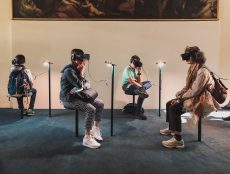
Articles
Editor’s Picks
How Do Technology and Mental Health Intersect on Campus?
By Henry Kronk
November 22, 2019
Two striking phenomena have been on display on college campuses in the past few years. For one, technology and mobile devices have become inextricably integrated with the student experience. Among adults between the ages of 18 and 49, 91% now own smartphones and 82% are active on social media. Many professors enthusiastically put these devices to use in the classroom, and many see their use as productive. At the same time, mental health issues have doubled in the past six years.
That’s according to the Healthy Minds Study, an annual report that researchers from the University of Michigan have prepared since 2012. The latest, which covers the 2018-19 school year, compiled data from over 62,000 college students.
More Technology Use Means Worse Mental Health?
Do these two trends intersect? Many think so. In 2017, generational researcher Jean Twenge, who holds a PhD in psychology from the University of Michigan and currently teaches at San Diego State University, asked in an Atlantic article, “Have Smartphones Destroyed a Generation?” (The article stands as a good example of Betteridge’s law.)
As Twenge writes, “The arrival of the smartphone has radically changed every aspect of teenagers’ lives, from the nature of their social interactions to their mental health.”
There’s only one thing missing from Dr. Twenge’s alarming words: data supporting her conclusions.
That is not the case with a meta analysis published this year in Frontiers in Psychiatry which also has been supported by the National Center for Biotechnology Information. Researchers Emily Lattie, Sarah Ketchen Lipson, and Daniel Eisenberg take up the claim voiced by Twenge and others that mobile phone and/or social media use has led to mental issues across America’s youth.
They write, “While several studies have found that time spent on social media and use of multiple social media platforms is associated with poor mental health, a more recent, particularly rigorous examination of three large datasets found that while the association between personal computing technology use and adolescent well-being was negative, it explained at most 0.4% of the variation in well-being. Further, these studies have been correlational and thus cannot assert causality. Rather than thinking of social media as inevitably causing poor mental health, it may be more useful to distinguish between healthy and unhealthy use of social media.”
Correlational, Not Causal
The researchers also point out how technology, social media, and mobile devices can serve as the frontline of mental health treatment.
The write that, “continuous access to personal computing via one’s smartphone brings with it a host of opportunities for mental health intervention programs. Technology-enabled mental health services, including those delivered online and via apps, offer the possibility to expand treatment options and reduce barriers to mental health services. Among multiple subpopulations (from children to older adults) and for many presenting problems (including depression and anxiety), technology-enabled mental health services have demonstrated efficacy.”
Many of these have already been deployed. Many services, for example, allow people to access counseling and therapy via chat or videoconference. Others seek to intervene by delivering information and resources to people who may be struggling in need.
With all this said, health professionals have long identified the possibility of smartphone, social media, or device addiction. What some call nomophobia is a separate issue and deserves its own space.
Featured Image: Woubishet Z. Taffese, Unsplash.









No Comments